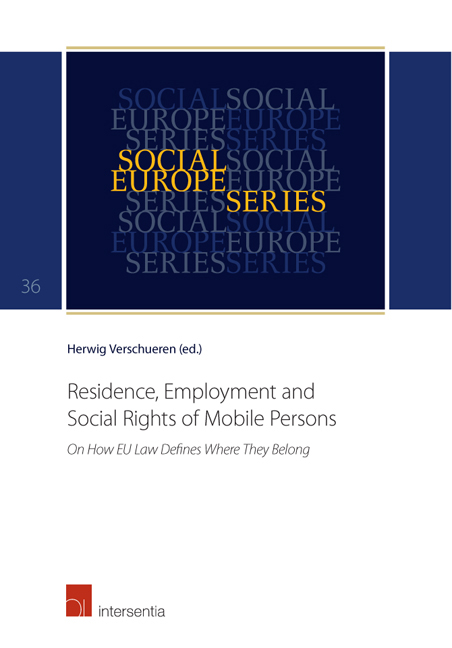Book contents
- Frontmatter
- Preface
- Contents
- List of Abbreviations
- List of Contributors
- Chapter 1 How EU Law Defines where Mobile Persons Belong. An Introduction
- Chapter 2 Family as Link. Explaining the Judicial Change of Direction on Residence Rights of Family Members from Third States
- Chapter 3 The Direction of the Court's Family Reunification Case-Law. A Plea for (Timely) Moderation
- Chapter 4 Sufficient Resources and Residence Rights under Directive 2004/38
- Chapter 5 Free Movement of Persons and European Solidarity. A Melancholic Eulogy
- Chapter 6 Once a Foreigner, Always a Foreigner. Who Does Not Belong Here Anymore? Expulsion Measures
- Chapter 7 Who Does Not Belong Here Anymore? A Statistical Snapshot of Member States’ Practices
- Chapter 8 Civic Integration Exams in EU Immigration Law. What Integration is Not in European Law
- Chapter 9 I Study Here, and Thus I Belong? Mobile Students in the European Union
- Chapter 10 Being Economically Active: How It Still Matters
- Chapter 11 Where Do EU Mobile Workers Belong, According to Rome I and the (E)PWD?
- Chapter 12 Conflicting Rules of Conflict: Social Security and Labour Law
- Chapter 13 Conflicting Rules of Conflict: Social Security and Labour Law. A Response
- Chapter 14 Where Does the UK Belong?
Chapter 11 - Where Do EU Mobile Workers Belong, According to Rome I and the (E)PWD?
Published online by Cambridge University Press: 22 September 2018
- Frontmatter
- Preface
- Contents
- List of Abbreviations
- List of Contributors
- Chapter 1 How EU Law Defines where Mobile Persons Belong. An Introduction
- Chapter 2 Family as Link. Explaining the Judicial Change of Direction on Residence Rights of Family Members from Third States
- Chapter 3 The Direction of the Court's Family Reunification Case-Law. A Plea for (Timely) Moderation
- Chapter 4 Sufficient Resources and Residence Rights under Directive 2004/38
- Chapter 5 Free Movement of Persons and European Solidarity. A Melancholic Eulogy
- Chapter 6 Once a Foreigner, Always a Foreigner. Who Does Not Belong Here Anymore? Expulsion Measures
- Chapter 7 Who Does Not Belong Here Anymore? A Statistical Snapshot of Member States’ Practices
- Chapter 8 Civic Integration Exams in EU Immigration Law. What Integration is Not in European Law
- Chapter 9 I Study Here, and Thus I Belong? Mobile Students in the European Union
- Chapter 10 Being Economically Active: How It Still Matters
- Chapter 11 Where Do EU Mobile Workers Belong, According to Rome I and the (E)PWD?
- Chapter 12 Conflicting Rules of Conflict: Social Security and Labour Law
- Chapter 13 Conflicting Rules of Conflict: Social Security and Labour Law. A Response
- Chapter 14 Where Does the UK Belong?
Summary
INTRODUCTION
In this chapter we critically analyse criteria and concepts used by the EU legislator and the Court of Justice (CJ) in order to establish the place(s) where mobile EU workers ‘belong’ in relation to their labour law entitlements. In this context the term ‘belonging’ refers to the fact that the mobile worker is included in the group that is covered by a given national system of labour law – either fully or partially. They are beneficiaries thereof and bound by it. Because of the private law character of the employment contract between employer and employee, the rules of private international law (PIL) play a central role in deciding which law applies to a given labour relationship with transnational elements. Nowadays, the law applicable to an employment contract is determined in all EU Member States by the PIL rules contained in Article 8 and 9 of the Rome I Regulation. Additionally, the Posting of Workers Directive (PWD) is of relevance in the specific situation of cross-border posting of workers. We will examine these legal instruments and their interpretation by the CJ from the perspective of ‘belonging’: why do the conflicts rules attribute a situation to the law of country A rather than country B? What underlying system of ordering is at work here? As will be shown, both in (the interpretation of) the relevant provisions of Rome I and in the PWD, several lines of ordering are visible, informed by the specific goals of labour law. These ordering lines may carry with them different types of ‘belonging’, attributing workers to legal systems on the basis of the territory and/or the branch of industry in which the work is performed, or the organisational framework of the employing company.
Our analysis is based on the assumption that both Rome I and the (E)PWD may be seen as tools to strike a balance between the types of ‘belonging’ involved, in situations where this is necessary because they do not lead to the same applicable law. Striking the most suitable balance is not a ‘static’ exercise but rather an ongoing game where different weight may be given to the distinct lines of ordering depending on the specific circumstances of the individual case. The ‘right’ balance may also change over time in order to adapt to new political compromises and/or developments in society.
- Type
- Chapter
- Information
- Residence, Employment and Social Rights of Mobile PersonsOn How EU Law Defines Where They Belong, pp. 215 - 254Publisher: IntersentiaPrint publication year: 2016
- 2
- Cited by

